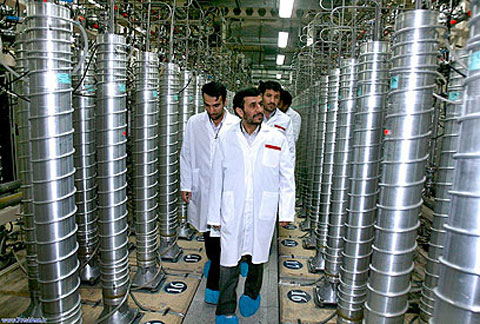Iran moved nuclear devices to the ground
Iran began moving uranium enrichment devices to an underground facility to avoid possible attacks on its nuclear plants.
>>>Iran launches first nuclear power plant
"Engineers are working hard to prepare the facility for the centrifuges in Fordo, under a mountain, to avoid being attacked," Iranian national television quoted Iranian vice president Fereidoun. Abbasi said.
Fordo is a secret facility located in the northern city of Qom, central Iran. This facility contains nearly 3,000 centrifuges. Preparation for the facility has been underway for months, with wiring, pipelines and other preliminary installations just completed in recent weeks.
Mr Abbasi, who is also director of Iran's nuclear agency, did not reveal how many centrifuges were transferred to Fordo to serve the uranium enrichment program. Iran has been making 5% uranium enrichment for many years. By February 2010, Iran began enriching the uranium storehouse at a level of 20%, citing the need for high-grade fuel to produce cancer isotopes. This data caused concern for the West because fuel enriched at 20% could quickly transform into fuel for nuclear warheads.

Iranian President Mahmoud Ahmadinejad (head) visits
Natanz uranium enrichment plant. (Photo: AP)
The worries of the Western countries are getting bigger as the International Atomic Energy Agency (IAEA) announced yesterday that there is evidence that Iran is studying and developing particle weapons. multiply.
Britain and France yesterday urged the Security Council to convene a meeting on new and aggressive sanctions against Iran. Alain Juppé, the French Foreign Minister, said the UN's "unprecedented scale" of sanctions is completely worthy of Iran.
British Foreign Minister William Hague said the conflict with Iran is "entering a dangerous phase". "The government will soon announce unilateral sanctions for Iran's financial and oil sectors, as well as organizations and individuals involved in the country's nuclear program."
The US also said it was considering adding pressure to Tehran.
Meanwhile, Russia declared to stand outside these sanctions and held an emergency consultation with allies after the IAEA published the report. Russia believes that the information in the report is imposing and sanctions are just the way Western powers use to overthrow the incumbent government of Iran."We do not accept sanctions with Iran and do not intend to consider this proposal," Russian Foreign Minister Gennady Gatilov said.
Russia had previously been reluctant to support the four sanctions imposed by Iran on the Security Council. The country emphasized that the ban on weapons and other sensitive technology approved by the Security Council in June 2010 was sufficient to ensure current security. Russia also condemned Israel when it issued a warning over the weekend about an upcoming attack on Iran
In response to the fierce response of the countries, Iranian President Mahmoud Ahmadinejad criticized the IAEA's report as unfounded and under pressure from the United States. He asserted that Iran's position "would not deviate even one cent" from the nuclear path it is pursuing.
Iran's nuclear issue has always been a hot topic for the international community. The US and its allies accuse Iran of using uranium enrichment programs to build nuclear bombs. However, Tehran has always denied accusations and claims its nuclear program is for peaceful purposes only and continues to conduct missile tests during the past time.
- Iran announces the feat of nuclear technology
- Iran-Russia agreed to build 2 more nuclear power plants
- Iran launches the first nuclear power plant
- 5.7 Richter earthquake near the Bushehr nuclear facility of Iran
- Nuclear race in the Middle East
- Iran has increased its intensity to triple uranium enrichment
- Suspected that the crust shifted after the Korean nuclear test
- Rich uranium is about to dock in Iran
- Find the culprit causing earthquakes in Iran
- Iran built a new generation uranium enrichment centrifuge
- First move nuclear fuel in Fukushima
- Iran launches new Iran-Sat surveillance satellite system
 Vietnam 5th Asian champion on fuel-efficient vehicles
Vietnam 5th Asian champion on fuel-efficient vehicles We can read all NASA studies completely free of charge
We can read all NASA studies completely free of charge Singer and songwriter Bob Dylan won the 2016 Nobel Prize for Literature
Singer and songwriter Bob Dylan won the 2016 Nobel Prize for Literature Scientific revolution in Asia
Scientific revolution in Asia